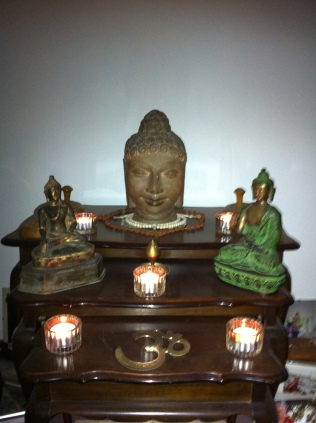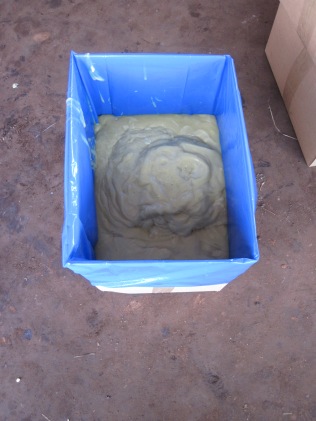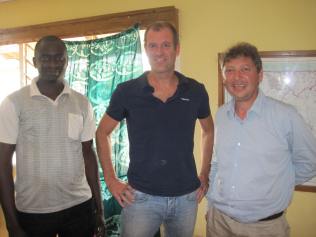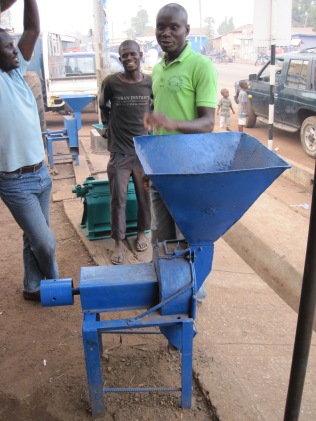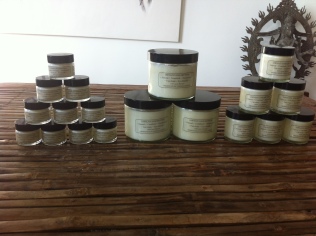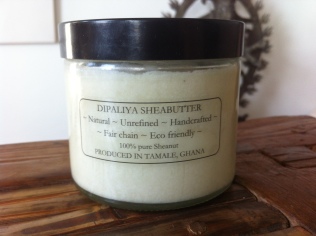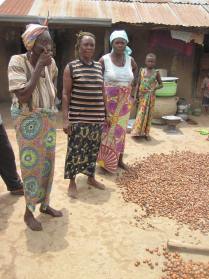Alain Volz
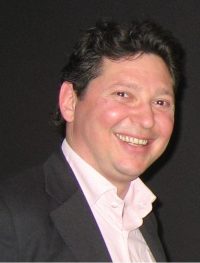
Alain Volz
Story of an emerging Social Economy that combines tradition with innovation.
In this article I will describe the journey Umar Mohammed and I are travelling as Leap into Life Dipaliya and how my journey started. Those who know the Star Trek series recognize the first sentence written here above. Though we haven’t left planet Earth – on the contrary, we are more closely connecting with Her – is what we do quite different from what is commonly known and different from our own previous experiences. We are on a journey to the unknown and exploring new territories like captain Kirk and his crew on the Starship Enterprise.

To boldly go where no man has ever gone before …
The territory that we are exploring is best described by the following question:
“How can we live together in a world where everything is connected; what does it mean for the way we share resources and earn our living; and how do we make best use of the richness in local diversities to survive as a whole?” Shea
Nature survives through diversity and yet Human has created a world of universal ruling patterns despite local differences. Despite differences in cultures, traditions and life conditions we have created a global economy that is dominated by one single principle: increase of growth. We copy-paste predominantly Western principles in different cultures or we integrate local differences into the ruling unified mindset. This is against Nature in general and against our nature as a species. It denies differences that are there to be valued and appreciated. This doesn’t serve the so called ‘developing countries’ nor does it serve the ‘developed West’. Most of the challenges we face as a species haven’t been resolved; tensions within and between communities/cultures are increasing and the planet Earth we are living on is protesting loudly against what human has is doing to Her.
On the global scale our current ways of thinking and acting have surpassed their peak of success and are in decline. We can fight and resist to it – trying to preserve what we have obtained/achieved – but finding new ways to collaborate, live and do business together are much more effective for survival and growth.
We ask questions in order to find answers, but maybe the questions we are asking are not the right ones. The answers that come to us might be misinterpreted due to our limited understanding of reality, but we are not open to even question our own mindset and understanding of reality. Something that doesn’t ‘fit in the box’ simply is labelled as irrelevant or false.
We are too easily satisfied with ourselves, we become more and more self-oriented, and we call something “innovation” where it is actually not much more than something new that comes from the same (old) level of understanding that makes us fail. We do not ‘learn from the future’ (e.g. the promise of climate change) and keep repeating mistakes from the past.
Buddhists say that the cause of all suffering is separation. In general we have become separated from the Divine laws of the universe (our protecting Father); we have become separated from the Natural laws on planet Earth (our nurturing Mother); we have become separated from our own Human nature (our identity as a species); and we have become separated of each other on individual and collective level. It is causing conflict, hunger, poverty, pollution and death.
I strongly believe we need to reconnect, and to reconnect we need to ‘reinvent’ ourselves; not only by reconsidering our ways of handling, but also by finding new ways to live together. With Leap into Life we are trying to find new pathways – just like captain Kirk and his crew were exploring the galaxy – with an open mind (heart and will), trying to make best use of the diversity of our crew and the different qualities they hold.
We are not the only ones doing this and our journey most certainly is not the only way things should be done or the only solution for the issues we face as a collective. But we do believe our path is one that is making a difference and has significance beyond our local scale of operation. Otto Scharmer & Katrin Kaufer’s book “Leading from the emerging future” holds some interesting other examples.
The journey is much more important to us than the destiny because we trust in destination, intention and effort. This might sound abstract, but actually it is not. The issues we are dealing with are quite real and undeniable. People with lack of food and without perspective of a better future; community members dying at young age; land that is deteriorating and turning into dessert; increase of violence and crime; and a growing amount of people leaving their homes to find a better future elsewhere.
We work hard to achieve results and we have defined ‘results’ in a way that is different from commonly known. And we work from the intention of sharing; everything Umar and I do must benefit others in our communities and everyone who actually contributes doing ‘the work’ must receive their honest share.
Umar and I have had only one dispute; which one of us is captain Kirk? First we were both pointing at the other when someone asked us “who is in charge; who is the captain?” We decided we both are and apply dual leadership. Dual leadership as such is not very new to me. I have been applying it for many years, using Holacracy in the Dutch Center for Human Emergence (CHE-NL) and facilitating leadership teams in the Netherlands. But in this constellation, working on two continents, dealing with extreme differences in personalities and life conditions dual leadership is very new.
Umar and I have our roots in different cultures and both of us are beyond the edge of what is common behavior within our own culture. There are extreme differences between us and at the same time we have a very strong common ground that connects us deeply. This combination works out very positive for us and ‘our people’; we somehow manage to combine our different perspectives and experiences in a creative partnership that leads to concrete results for a larger group of people surrounding us.

Umar is a very traditional man, born and raised in Tamale and deeply rooted in Dagomba tradition and community. He is a prototype of a communal man, highly respected for his sincerity and contribution to the community. I consider him to be an example of a leader in the ‘old’ and genuine African tradition.
Chief Chikanta in Zambia (a Western educated man who gave up a respectable position in banking for a chief role in rural Zambia because the elders of his tribe decided that he would be the most appropriate successor for the departed chief) once shared with me the difference between good leadership in African tradition and good leadership in Western tradition. You can find the video-interview with Chief Chikanta in one of my older blogs. He said: “In Western tradition leaders are respected for what they achieve in terms of the wealth that they have gained; castles, land and money. In the West a good leader has much more than his people; he gains respect and position by showing his power and wealth. In African tradition, however, a proper leader first takes care of his people and secondly of himself. He is respected by the wellbeing of his community and prosperity he has brought for his people. In African tradition a proper leader has little more than his people, but only little.”
Unfortunately those kinds of leaders are rare to find nowadays, even in Africa. Most African ‘leaders’ seem to copy the Western style of leadership, taking more good care of themselves than for the communities they serve. Chief Chikanta is an example on how it once was, and Umar Mohammed – though he is not formally a chief – is one too. Despite the fact that he is not highly educated, I can see that Umar could have been a relatively wealthy, ‘successful’ businessman in Ghana. He is a talented businessman and trader, but he doesn’t make a whole lot of money, lives a very modest life and spends much of his earnings to help others in his community. For Dipaliya and Leap into Life we have defined success as: “The amount of hearts we touch in a positive way and the amount of families that benefit from our actions.”
Myself I would describe as an individualist. I am sort of a nomad; constantly on a journey, travelling to find my own path in life. Though I have made working with groups my profession and often end up in influential positions within the groups I participate in, I like my privacy and the stillness of solitude. I also hold quite some fear for groups and some patterns in group dynamics. As a matter of speaking, I look for the exits (escapes) while entering the room. This also is one of many reasons I had chosen a career as external management consultant. I could leave after the job had been done. In terms of Western leadership as described above I have done poorly, primarily due to the choices I have made. I’ve build a reputation as a successful change agent and pioneer, but I never made a lot of money with it. My choices were always led by the quest I was following; a new path to explore or a professional challenge to learn from. In my fantasy I have found in Umar a likeminded soul.
What connects us deeply is a combination of intention, effort and submission. We have the intention to provide a broader group of people a perspective of a future that brings prosperity and peace. We strongly believe in what we do and we are willing to work hard to achieve what we dream of. We are both very serious in our spiritual practice and have chosen to serve a greater cause than our own individual wellbeing. We both have chosen to serve the Divine, though we have different names (Allah, Jaweh, Life, Grace) for it and we apply different spiritual practices.

The journey we have chosen to travel together hasn’t been easy for us. It has taken us three years before we were able to actually connect and do the work we are doing now together. Though we both speak English we still have to learn a common language. It takes us time and effort to really understand each other. On a daily basis we face issues and challenges that need to be resolved; from cash flow issues to crops failing; from people becoming sick to others challenging the integrity our work. Over the last year both Umar and I have been physically ill for several months in a row. But we continued and seem to be rewarded for our efforts and perseverance.
My first visit to Ghana (in 2011) was on invitation by the Dagomba community, represented by Mr. Fuseini Yakubu. It was he who invited me, but I didn’t go because of the invite. I went because in my meditation and prayers “something” told me I had to go. I went with the idea to follow up on a dream that was born in Zambia; to establish a program where Westerners and Africans could learn from each other’s wisdom and experience in a facilitated program.
In 2012 I returned to Ghana with a designed framework to explore what purpose the program should serve and what benefits were expected by people in Ghana. Though I worked with other people, Umar and his wife took me in their house and took care of me while in Tamale. This was because Fuseini had asked him and because it is custom according to Dagomba tradition and hospitality.
The purpose and principles we now use for Leap into Life were born in the 2012 sessions we held with a diverse groups of Ghanaian entrepreneurs and leaders. PP Hammond and Patrick Mang from JCI Ghana and Isaac Ampomah from Concern Health Education Ghana had a significant role in this process. Not only did they participate in the framework I designed, they also invited people from their networks to join the conversations and workshops. The purpose and principles we are currently still using for Leap into Life have grown out of the conversations Fuseini, Isaac, Patrick, PP and I held and in our efforts to start different projects in Ghana. Though they are not involved in the projects we are currently running as Leap into Life, I honor their contribution to where we are now.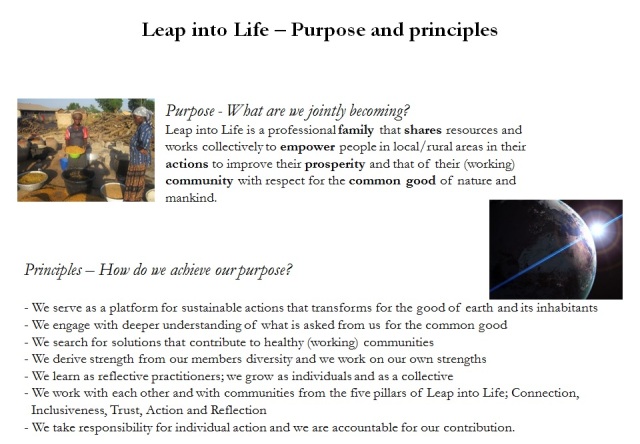
Abdul-Latif Issahaku from MTN Ghana also has played a significant role in the emergence of Leap into Life as it is now. He introduced us with the MTN Foundation and over the years I have had several conversations there. MTN Foundation and I still have contact on a regular base with the objective to find ways to turn a shared ambition (to contribute to communities) into a collaborative relationship.
Most of all Abdul-Latif has been of great support to me on a personal level. Though I am deeply integrated in the Dagomba traditional life, I am still (sort of) a Westerner. Many aspects of Dagomba culture are, though I understand them very well and value them quite highly, still quite different from how and where I grew up. Though I am much less judgmental than most Westerners I also can’t deny that where and how I grew up affects my view and actions. I am confronted with things that are new to me and sometimes cross my boundaries of understanding and/or acceptance. I try to resolve these conflicts within myself, but can’t always. As an educated Dagomba man who has lived and studied in the Netherlands at Nyenrode University, Abdul-Latif is my most valued teacher in my attempts to bridge the two different cultures/traditions.
Mulaika Salisu also has been of great support to the work Umar and I have been doing. Not only has she offered her house in Tamale for me to live in. As a business woman with Dagomba roots she has helped me in finding constructions for governance and financial management.
Other people we need to be grateful for are Kojo and Audrey Biney, Frederick Larby from Ghana Freezone Board Office and Patricia Safo from JCS Capital Investments. Kojo, Audrey and Frederick have been participating in the sessions defining the Leap into Life purpose and principles and contributed to our understanding of what would contribute to the communities we address to work with. Frederick also introduced us with a potential new client for Dipaliya Sheabutter in Ghana. Patricia was my greatest support in moments of serious doubt. Every time I tended to give up, she was the one who ‘pushed’ me back into my faith, telling me not to give up.
 The Leap into Life program that I initially designed was meant for corporate employees in the West and community leaders in Ghana. My professional background and network was in corporate and the idea was to help people in multinationals to internalize the sustainability targets of their company by integrating them in their running projects. The program was a nine month journey for Western corporate world with a 10 days visit to Ghana as experiential learning journey. It was designed as a U-process (a facilitation process designed by MIT, the Society of Organizational Learning and the Presencing Institute) and the learning journey was designed as going deep down the bottom of the U. I was very fortunate to have two world class facilitators with African roots willing to participate as co-trainers during the learning journey; Martin Kalunga Banda – director of the Presencing Institute Europe/Africa and Yolanda Hegngi – former global head leadership development at the WorldBank.
The Leap into Life program that I initially designed was meant for corporate employees in the West and community leaders in Ghana. My professional background and network was in corporate and the idea was to help people in multinationals to internalize the sustainability targets of their company by integrating them in their running projects. The program was a nine month journey for Western corporate world with a 10 days visit to Ghana as experiential learning journey. It was designed as a U-process (a facilitation process designed by MIT, the Society of Organizational Learning and the Presencing Institute) and the learning journey was designed as going deep down the bottom of the U. I was very fortunate to have two world class facilitators with African roots willing to participate as co-trainers during the learning journey; Martin Kalunga Banda – director of the Presencing Institute Europe/Africa and Yolanda Hegngi – former global head leadership development at the WorldBank.
During our journey it became clear that Ghanaian community leaders were not served with a 10 days program; that it would not contribute to achieve the objectives we had formulated for Leap into Life Ghana. In Europe I was close to signing a contract with two international companies, but the ‘financial crisis’ led to cost-cutting and overruled the decision to have employees participate in the program.
Instead of working with a program in Ghana I returned to learn what we could do with the team that had been formed in Ghana. We registered Leap into Life Ghana Foundation with the purpose to start projects in the communities as a collective. Over the next few years we tried many different approaches, but none of them grew into solid projects. We tried, failed, tried again and failed again. I kept returning because the “something” telling me I should kept voicing. I also had gained some new Ghanaian friends who told me that I should not give up because I had already achieved so much more than any other in such a short time. I couldn’t see that myself, but I listened. However in 2014 I decided to withdraw from Ghana and went there to make a good closing and to say goodbye to the people I had been working with or who had been supporting us.
I also visited Umar and his family. Though I had spent much time there as my hosts, we had never spoken of his activities. It was at that time that Umar started sharing with me about his community work for Dipaliya Women’s Association and the challenges he was facing. The Dipaliya groups are traditional women circles and the women tried to earn a small living with Sheabutter making and provide food with small scale farming. But there were no contracts for Sheabutter and the plots for farming were small or not there. When Umar asked if I wanted to help him I couldn’t refuse. But how could I contribute?
We spoke of the issues Dipaliya and Umar were confronted with; about his reasons to serve as manager for Dipaliya; my explicit and uncommon view on developmental aid, entrepreneurship and what Umar and the communities should NOT expect from me. I learned about Sheabutter, about Dagomba tradition and shared my views and understanding. And since there was sort of nothing there we decided to work from scratch with Umar his deep rooted position in the Dagomba communities and my experience/skills as innovator. We were going to “build a new building” and dreamt of a Cathedral. We were going to use best of both worlds to create something new that could serve both our communities in Africa and in Europe. And we were going to start at the root; in Africa with the neediest people surrounding us.
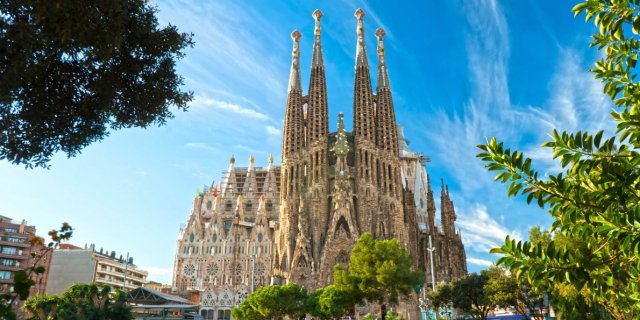
It was quite clear to me that we had to start at the bottom to lay a foundation for the building. We decided that Sheabutter making should be our entry point to revive Dipaliya Womens Association. The women were the neediest and Sheabutter could become the carrying fundament for what we were to build. Sheabutter still is the spine for the new body that we are building.
Though 70% of international aid in Ghana goes to Northern region, the women (and other communities) we work with did not have any benefit of it. We also decided to work from own strength and with own resources and NOT to ask for subsidies, loans or grants. This hasn’t made things easier for us, but at the same time does scarcity bring up the best in our creativity. And, more important, we have always been able to make our own decisions based on what we find right and righteous without an external party deciding for us or having to be accountable to others than each other for spending of our money.
The principle of loans, debt and actually the whole international system of finance is quite contradictory to the Dagomba values of family sharing. The Dagomba values are very intertwined with a local informal economy and the ‘formal economy’ was rather pulling money out of the informal economy than putting money into it. For every dollar going into Africa, 4 dollars are flowing back to Western countries. By doing so it is weakening the communal values and preventing the tribal order to evolve in a healthy, natural way. The global economy is destroying the local informal economy with all consequences for traditional Dagomba values and traditional life. People become poorer instead of more prosperous, families are separated and individuals become more selfish and greedy.
We were to build an alternative that would help preserve the Family Sharing tradition, strengthen it, and bring it to 21st century standards. This is very much aligned with the discussions in the West on wealth and the future of global economy. Most of the discussions in my own country I find quite limiting, to be honest, and what people in the West call a ‘Sharing Economy’ is not much more than people lending resources to another without real money involved. The used examples of sharing economy like Uber and AirBNB have – in our definition of a sharing economy – nothing to do with sharing. The business-models are from within an old mindset; the only innovative is that technology is being used to make few people earn a lot of money by facilitating others to share their resources. It is ok, but not good enough for us. Umar and I promised each other to do differently, we were to do things; to experiment and learn from our actions instead of to talk about how it should be or could be. So we started with Leap into Life as a real-life action learning process and Dipaliya as the business case to work with. We became the students.
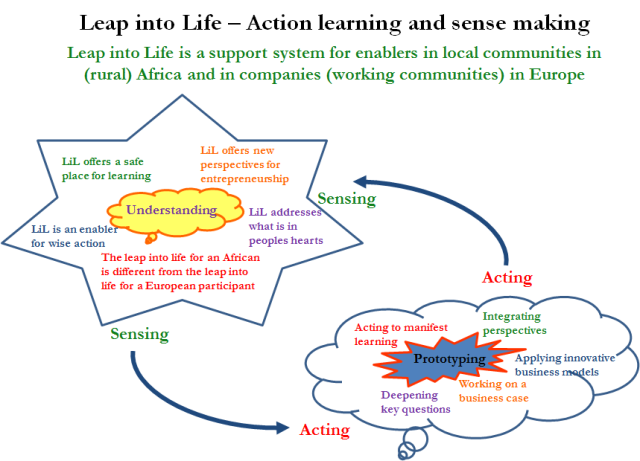
First I tried to find ways to sell Sheabutter in Europe. In a short period I learned a lot about the Sheabutter market; the high complexity of it and how international trade affects the local communities and local market in Ghana. It is quite painful to see and understand how a trader ‘going short’ in the virtual Wall Street economy negatively affects the lives of the people in the communities in the communities we work with. It is very hard to believe or to accept that people in the communities are without food because the price of – for instance – Sheanuts is too high as a consequence of highly complex constructions, designed by bankers, international traders and stock exchange dealers to make profit for a small group of people at the other side of the oceans.
Many people told me that logistics would be the problem, but I learned that I could easily bring a 20 ton container Dipaliya Sheabutter to Europe with the network I had. It was selling the Sheabutter in Europe that would be a problem. I had no access to market and business to business clients are interested in refined Sheabutter. Dipaliya produces unrefined, handcrafted Sheabutter and at that time it wasn’t possible for us to refine the Sheabutter without taking uncalculated, high risks.
Our quest to find potential buyers – the Dutch team at that time was with Laurens Berkvens, Peter van Roermundt and Daiva Razmarataite – led me to a Dutch based company called Butterwise. Jeroen Wijs, the owner, appeared also to be representing Savannah Fruits Company (SFC) in Europe. SFC is a Tamale based trader in natural oils and used to be a client of Dipaliya. One of the owners, Bart Boterman, also is a Dutch man and we managed to have a meeting in Tamale with the Savannah Fruits Company staff. This resulted in a contract for Sheabutter making and a long term agreement to collaborate (Memorandum of Understanding – MoU). In 2015 Dipaliya has sold over 35 tons of Sheabutter to SFC and the company now has become more to us than a preferred buyer only. For 2016 we already have established guaranteed sales to SFC of 40 tons Sheabutter in the next 4 months. SFC is also helping Dipaliya to become certified as an organic Sheabutter production site, once the Dipaliya Sheabutter center in Sakuba has finished.


We have started building the center some time ago and hope to complete in the next 1-2 years. We are using the group bonus Dipaliya has received for high performance. In 2015 I prefunded a grinding mill and a Motoking (transport vehicle) for Dipaliya. The women had about 75 cents in costs on every Euro they earned for rent of a grinding mill and transport there. With the mill and Motoking the costs have reduced to zero for the women. We rent out the mill to finance maintenance and electricity bills. Currently we are working on the purchase of a second mill.
Over time my focus on Sheabutter sales has shifted. For business to business sales of Dipaliya Sheabutter I have shifted the attention from the Netherlands to Ghana. SFC is our preferred buyer and trusted partner, but we have a production capacity that exceeds their demand substantially. Currently, we are connecting with other (inter)national traders in Ghana with objective to achieve more contracts for Dipaliya Womens Association. It will bring more income for the (currently) 800 women and it will help us to generate more money to speed up completion of the Dipaliya Sheabutter center in Sakuba.
To great surprise of many, including the person offering, we refused an offering of a container of bricks from Europe for the Sheabutter center. Though we were grateful for the offer we couldn’t accept. It is well meant, but doesn’t serve the community in the way we want to. We make our own blocks for the buildings, using local sand and materials. This provides another 10-15 people work, as does the construction of plumbing, electricity and other parts of the center. It breaks with the pattern of dependency and creates employment in the local community. We can, however, accept donations and are working on a construction where people in Europe can share from ‘communal’ perspective instead of ‘aid perspective’. This fits in the Family Sharing tradition like the brick makers who give us a few extra blocks when we order with them. Sometimes we pay in food instead of with money.
Where I am focusing on realization of more contracts for the Sheabutter making, Umar coordinates the process of production and delivery, and the daily contacts with Dipaliya clients for Sheabutter. Umar and I both work on a voluntary/communal base without receiving revenues; we work as leaders who serve. Individual payment of the women is organized by the leaders in the women circles; the money received goes directly to them. The Dipaliya staff – consisting of Umar, myself and two other people – helps them with administration and external relations. Most women don’t speak English and are illiterate; without our help they would not be able to produce as much Sheabutter as they currently are. The two staff members active on operational level do get paid for their contribution. I prepared, but the women signed the contracts with Savannah Fruits Company!
How Umar and I run the Sheabutter production and sales in Ghana is strongly aligned with Dagomba tradition and with principles of ‘Servant Leadership’ that is currently very popular in Western management books and courses. In Dagomba tradition an honorable man serves the community and provides security and safety for women. Mostly this means that the man works to provide income and shares with his wife and family. Servant Leadership implies that the manager (leader) makes sure that his/her people have all the necessary means to do what they are best at. Instead of telling people what to do and how, the leader asks what is needed to achieve company objectives, makes sure that the team is provided and ‘protects’ the team from external influences that interfere.
Umar and I have a position where we can make decisions for the women. They trust us and respect us. When we tell them what we think should be done, the women will follow. This actually is common dynamics in Dagomba tradition where women are more submissive to men. But we do not, and here is also where innovation is. Instead of telling the women we ask.
How we decided to purchase the grinding mill is a good example. It didn’t take me much thinking to see that a mill would increase the women’s income by three or four. But instead of telling the women of our plans we asked them what they believed we should purchase after receiving the group bonus for the Sheabutter making. “A grinding mill” was the unanimous response. “But a grinding mill is way too expensive and we cannot buy it from the money we receive. Isn’t there anything else we should buy?” I asked. “No, then we have to save for the grinding mill until we have enough.” Decision made.
And I prefunded the purchase because I could and didn’t want to wait with increasing the income for the women. Currently we use the grinding mill not only for our own contracts. With the money earned by renting out the mill to other groups we can pay for our electricity bills and maintenance. And instead of losing 0.75 cents on every Euro, the women earn 1 Euro on each Euro received.
The handcrafted production and sales of Dipaliya Sheabutter in Ghana is crucial for all our other activities as Leap into Life. However I also started selling Dipaliya handcrafted raw Sheabutter in the Netherlands. It is still on a very small scale, but we are looking for ways to expand. There are several reasons why I started selling Dipaliya Sheabutter in the Netherlands.
First of all there is a financial reason. We do not have sufficient resources to fund our plans with Dipaliya and the Sheabutter center. Since we have decided not to work with donor funding or sponsorship that makes us depending on an external financer who decides or a loan that needs to be repaid, we need (and want) to earn our own money. The money earned in Ghana does help, but with sales of Sheabutter in Europe we earn more per kilo than we ever could in Ghana.
Secondly there is the quality of the product. I haven’t found many places in Europe where private customers can buy handcrafted raw Sheabutter in small quantities. Basically all Sheabutter sold in the European consumer market is refined or dry filtered, processed and mixed with other ingredients. There are many good reasons to do this, but when Sheabutter is refined or dry-filtered much of the vitamins and minerals go out of the butter. The raw (unrefined) product holds an extraordinary mix of vitamins that help the skin to rejuvenate, to heal and to stay healthy. It really is a high quality, all natural product that can ‘sell’ itself and I wanted to introduce it to the Dutch market as a better alternative for what is sold as Sheabutter now.
My third reason to start selling Sheabutter in the Netherlands is that it helps telling the story of Dipaliya and gives the women a voice in Europe. With the small jars I’ve chosen to use and the labels I have designed Dipaliya Sheabutter has become a brand. Dipaliya Sheabutter stands for quality, integrity, transparency and fair trade.
Fourth; selling Dipaliya Sheabutter in the Netherlands helps us to spread the story of the Sharing Economy we have built around Dipaliya. Instead of using the word “fair trade” I prefer to use the term “fair chain”. There is no middleman in between; not any traders that take some margin from Dipaliya. I am selling as a community member representing Dipaliya Womens Association. The women receive a more than fair share of each jar Dipaliya Sheabutter sold in Europe and for each individual jar I can tell exactly which woman has made the Sheabutter that is inside.
And finally; one can hardly imagine the impact it has had on the women when they heard that their Sheabutter was sold in Europe and they didn’t believe their eyes when they saw the jars, labels and brochures I have produced to sell their product.
Umar and I are helping the women to be proud of their tradition and their handcraft. Instead of holding up their hands like beggars, they can earn their own living, feed their children and have some extra money for school fees. This also is a novelty for the women with which they also have to learn to get used to. We are breaking some patterns in the tradition; not out of judgement but as a natural step for the women (and men) to take from where they are now. We bring them dignity and self-respect within the boundaries of Dagomba tradition, stretching that tradition a little at the same time.
Soon a web shop will be opened where one can buy Dipaliya Sheabutter online. In line with the tradition of sharing and the objective that others must also benefit from the activities Umar and I initiate I’ve given the management of the web shop completely in hands of a friend, Femke van Hellenberg-Hubar, who will be running the online sales as an independent entrepreneur and part of our sharing family. The name Dipaliya stays in ownership of Dipaliya Womens Associatiation in Tamale, but the web shop and company in Europe can carry the name Dipaliya.
Though my focus in Europe isn’t any more on large quantity sales of Sheabutter I’ve also not closed the possibility. Any possibility that passes by will be taken up in collaboration with Butterwise and/or Svannah Fruits Company. I’ve also introduced Jeroen Wijs from Butterwise with a friend who is a trader in the food market with the hope that they can start doing business together. Slowly I’m copying the principles of the Family Sharing system applied in Tamale to a Sharing Economy in the Netherlands. And there is real money going round, flowing in a complete different way one is used in trade or business. Money is now flowing into the informal economy of our community instead of flowing out. People are becoming more prosperous by working together as a Sharing Family. The thing that comes closest to how we work in Ghana and in Europe might be the Slow Money movement initiated by Woody Tash. We work with money we have and that we can trace in constructions that are understandable to the people we work with. Some of the constructions are very unfamiliar for a Westener, but they are very much aligned with the Dagomba tradition and with my views on what a real Sharing Economy is.
In the 2015/2016 season Dipaliya Womens Association has sold over 35.000kg Sheabutter in Ghana and the contracted production for this season has already exceeded that amount. In Europe Dipaliya Sheabutter is sold in five shops; Kappermee (Aalsmeerweg 30 Amsterdam), The SoulSister Vitamins (Elandsgracht 132 Amsterdam), Fine Fresh Food (Korte Houtstraat 14C Den Haag), Delano Delicatessen (Diemerplein 188 Diemen), and Metz Bio Markt (Orchheimer Str. 35 Bad Münstereifel, Deutschland).
We are entering communities in Northern Region for the collection of our own Sheanuts (organic) to be used by Dipaliya Womens Association. Thus currently provides work for approximately 50 women in rural areas. We expect the number to be increasing next season.
Having the production and sales of Dipaliya Sheabutter stable and growing in Ghana and in the Netherlands we are now focusing on other activities. We have started to setup an infrastructure for collection of Neem seeds. This will provide every woman in Tamale the opportunity to earn direct cash money on a daily basis and will provide work and income for a new staff member at Dipaliya Womens Association. The Neem seeds are sold to a new partner, GreenGro Ghana, which produces organic fertilizers and pesticides. With GreenGro Ghana we are working on a Memorandum of Understanding (MoU) and 2 business contracts to confirm our long term relationship. The MoU includes training of Dipaliya women in harvesting, drying and processing of the Neem seeds into organic products.
We have also started with organic farming on 3 plots in different areas in Ghana Northern Region. This project is intertwined with the relationship established with GreenGro. We started organic farming as a way to prevent the Savannah land turning into desert and to produce healthy food without toxic chemicals. We are using the GreenGro products on the land and are teaching farmers how to grow crops on their own land, using organic products and seeds.
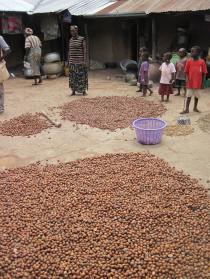 Willem-Albert Toose has become a dear friend and active contributor to the successes we have achieved in organic farming. Not only is his family most generous offering me a place to stay while in Accra. It is Willem-Albert who introduced us with Philomina Brittan from GreenGro (another wonderful person who does what she can to help us) and who shares his knowledge and network in organic farming. There are so many people we are grateful for contributing to the achievements made with Leap into Life Dipaliya. Without any of the people mentioned in this article we most definitely would not be where we are now. It shows that it is possible to turn a dream of community and sharing into reality.
Willem-Albert Toose has become a dear friend and active contributor to the successes we have achieved in organic farming. Not only is his family most generous offering me a place to stay while in Accra. It is Willem-Albert who introduced us with Philomina Brittan from GreenGro (another wonderful person who does what she can to help us) and who shares his knowledge and network in organic farming. There are so many people we are grateful for contributing to the achievements made with Leap into Life Dipaliya. Without any of the people mentioned in this article we most definitely would not be where we are now. It shows that it is possible to turn a dream of community and sharing into reality.
There are few more projects running in Ghana. We have been approached by Louis Bolk Agro Eco to participate in a project related to Tigernuts and we have plans to open an organic store in Tamale. I’ll write more on these projects and on how we collaborate with local communities in future writings.
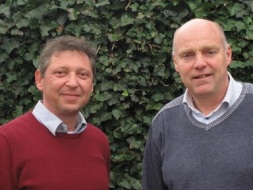 In The Netherlands we are about to setup a foundation “Leap into Life” that will support the activities with Dipaliya Womens Association. The purpose is to generate extra funding for the Sheabutter center and other expansion plans in a way that aligns with the principles we apply for financial management as Leap into Life. In order to achieve short term results we are hoping to establish collaboration with BeGiving and other parties in the Netherlands.
In The Netherlands we are about to setup a foundation “Leap into Life” that will support the activities with Dipaliya Womens Association. The purpose is to generate extra funding for the Sheabutter center and other expansion plans in a way that aligns with the principles we apply for financial management as Leap into Life. In order to achieve short term results we are hoping to establish collaboration with BeGiving and other parties in the Netherlands.
Together with Ruud Ort and Lex Warmerdam from Smit de Vries and with Martin Immelman and Herman Geesink from Urgenda/Duurzom we are working on 2 educational programs for entrepreneurs in the Netherlands. A visit to Dipaliya Womens Association with objective to learn from the Social Economy / Family Sharing System is central in one of the programs and an optional choice in the other. The program for SME (MKB) entrepreneurs has focus on sustainability and social entrepreneurship (MVO) as a business opportunity. Tessa Kappert from Landgoed Isis is also a trusted partner in this program, offering use of the estate as venue for one of the modules for a family sharing price.
The Sharing Economy or Social Economy Umar and I have been dreaming of and working on for the last two years has a firm base, is growing and has much potential for further growth. I’ll be writing more articles on the principles we work with and how they translate into concrete actions and results.
About the Author
Alain Volz M.Sc. (1969) – founder and director of ATMA – has studied Business Administration and Organisational Psychology. He started his career with Royal Dutch Ahold and has worked with IPMMC and TC&O. For 10 years Alain has been working with Twynstra Gudde Consultants and Managers as senior consultant Human Talent & Change Management. He is co-founder of the Center for Human Emergence in the Netherlands (CHE), a former member of the CHE alignment circle and founding director of CHE School of Synnervation.
Alain is expert in value based HR strategies, competency based HR systems, leadership development and human behavior in change processes. He uses an integral perspective in his work as change facilitator and Synnervator. His major challenge is to support organisations in discovering and enabling talent to contribute to sustainable economic performance. In doing so he strives for realizing strategy by connecting people.
Alain has written several books and articles on competency based HR, knowledge management and leadership development. He is guest teacher at the University of Amsterdam and the Radboud University Nijmegen. He currently focusses on leadership, complex collaboration (meshworking) and social technologies.

